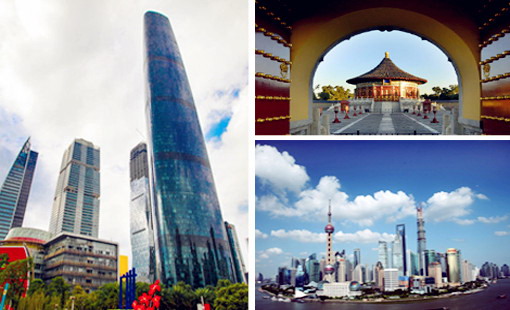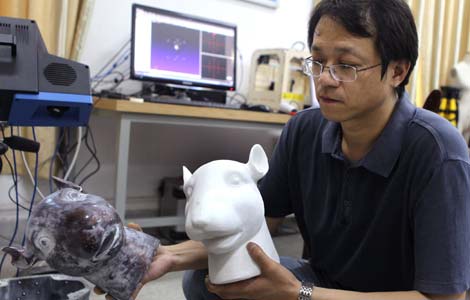Agenda for the future: Be proactive
Updated: 2013-07-22 08:19
By Oliver Barron (China Daily)
|
|||||||||||
Policymaking in China is often more reactive than proactive, but when short-term reactions are consistent with long-term goals, the motivation doesn't really matter.
In the first four months of the year, foreign currency inflows grew 556 percent year-on-year to a whopping 1.5 trillion yuan ($244 billion). While the previous government dealt with excess inflows and their inflationary impact through sterilization and strict administrative controls, the new government, led by Premier Li Keqiang, took the opposite approach, proposing a relaxation of controls on outflows. Among the new measures proposed were allowing individuals to settle trade in yuan and permitting them to invest overseas under an expansion of the qualified domestic institutional investor scheme.
Once inflows slowed from May. In July, authorities approved an expansion of quotas for foreign investment in the domestic market.
The quota for the qualified foreign institutional investor scheme, which allows foreign investors to convert dollars into yuan for domestic investment, was nearly doubled to $150 billion from $80 billion, while the yuan QFII scheme, which allows foreign holders of yuan to invest their funds domestically, was expanded to London and Singapore from the previous pilot in Hong Kong.
In both cases the policies were a reaction to short-term changes in capital flows. Not only were they more market-oriented solutions than those seen from the previous government, but they also represent clear steps toward achieving the long-term strategic reform goals of making the yuan more convertible under the capital account and pushing yuan internationalization.
There are three separate but related targets for yuan internationalization: increasing the supply of yuan overseas, making yuan an investible currency and making it a reserve currency. To increase the supply of yuan overseas, in 2009 China announced a pilot that would allow trade to be settled in the Chinese currency. After expanding the pilot a number of times, the amount of trade settled in yuan increased to almost one fifth of total trade by March 2013, up from just 3 percent in 2010.
To date, Hong Kong has been the major offshore yuan market.
Through the yuan trade settlement, the amount of yuan in deposit accounts in Hong Kong has risen to almost 700 billion from just 63 billion in 2009.
The expansion of the yuan QFII program to London and Singapore, combined with a newly announced 200 billion yuan currency swap agreement between UK and China, will mean other markets will become more important as well.
The most obvious benefit of the yuan trade settlement for China and its trading partners is the reduction in currency risk caused by fluctuations in the value of the US dollar. The increasing supply of yuan that results from it, however, brings further benefits.
First, foreign investors can act as a stabilizing force in the domestic equity markets and provide a new funding source for domestic debt markets.
Second, the issuance of yuan-related financial products in Hong Kong and other overseas markets opens more channels for domestic companies to finance themselves.
Third, it can make the yuan more liquid, setting the foundation for it to become a reserve currency.
To become a reserve currency, the final goal of yuan internationalization, will not be easy, as it requires more stable domestic financial markets and progress on capital account convertibility and interest and exchange rate liberalization.
No matter how much China wants the yuan to be a reserve currency, it will only become one once foreign investors are comfortable holding large amounts of it.
In order to make holding the yuan more attractive, China needs to first open the capital account to allow for more free investment of the currency. Before that can happen, domestic banks must be strengthened to a point where they can manage the impact of capital flows, including both limiting capital flight and being able to absorb capital inflows without contributing to risks of asset bubbles.
Banks will never learn these lessons so long as their profit margins are protected by the government-dictated spread between lending and deposit rates, meaning interest rate reform must be accelerated to achieve capital account convertibility.
In order to prevent arbitrage opportunities when liberalizing interest rates, however, China must also relax its grip on the currency.
The new government's response to problematic inflows in the first part of the year was to push forward with reform. Because growth in the world's second-largest economy slows, policymakers are again faced with tough choices. Either they enact market-oriented reforms as a way to drive growth, or else return to their old practices of boosting growth through infrastructure construction.
Loosening control presents its own set of challenges, but a return to old policies will only serve to make existing problems harder to address, including industrial overcapacity and unsustainable debt levels. This means that although neither option is risk-free, pushing reform, even if dangerous, is the safer option.
The author is head of the Beijing branch of the UK-based investment bank NSBO.
Related Stories
China's foreign investment policy not changing 2013-07-19 11:26
China remains a magnet for foreign investment 2013-06-04 09:16
Foreign investment guideline for regions revised 2013-05-17 03:15
China remains top for foreign investments: report 2013-03-21 09:58
Planned crude oil futures may see foreign investment 2013-03-13 10:42
Today's Top News
Minors going online to buy smokes
Forbidden City bans lighters, matches
Israelis, Palestinians kick off peace talks
Manning 'sorry' for US secrets breach
Snowden case not to affect US-Russia talks
Over 200 dead after Egypt forces crush protesters
Slowing economy takes toll
UN seek private firms' help in curbing HIV/AIDS
Hot Topics
Lunar probe , China growth forecasts, Emission rules get tougher, China seen through 'colored lens', International board,
Editor's Picks

|

|

|

|

|

|





